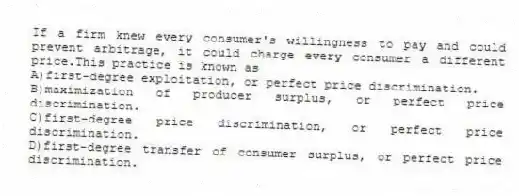
If a firm knew every consumer's willingness to pay and could prevent arbitrage, it could charge every consumer a different price.This practice is known as
A) first-degree exploitation, or perfect price discrimination.
B) maximization of producer surplus, or perfect price discrimination.
C) first-degree price discrimination, or perfect price discrimination.
D) first-degree transfer of consumer surplus, or perfect price discrimination.
Correct Answer:
Verified
Q112: Erin and Deidre, two residents of Ithaca,
Q113: Which of the following products allows the
Q114: In which market structure is it not
Q115: Insurance companies typically charge women lower prices
Q116: Perfect price discrimination is also known as
A)monopoly.
B)first-degree
Q118: Erin and Deidre, two residents in Ithaca,
Q119: A price-discriminating firm charges the highest price
Q120: Bubba's Hula Shack Bar and Bistro has
Q121: Suppose that a price-discriminating producer divides its
Q122: Figure 16-3
![]()
Unlock this Answer For Free Now!
View this answer and more for free by performing one of the following actions

Scan the QR code to install the App and get 2 free unlocks

Unlock quizzes for free by uploading documents